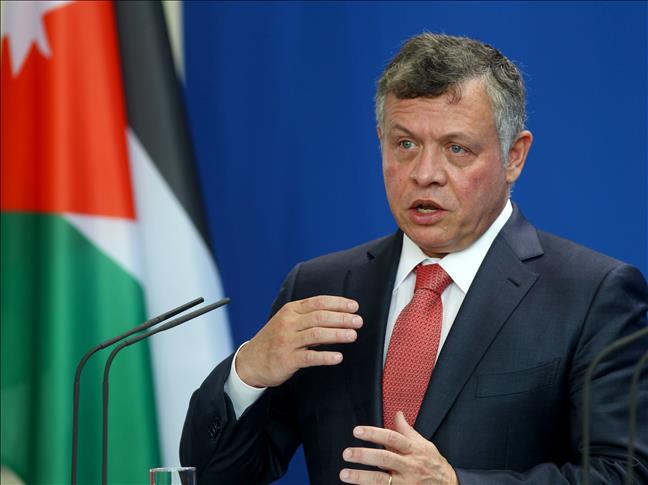
BERLIN
Jordanian King Abdullah II has announced his country will continue to support the Saudi-led operation in Yemen but is not considering deploying ground troops.
His comments came on Wednesday amid growing speculation that a Saudi Arabia-led ground offensive will be launched in Yemen, despite a five-day humanitarian cease-fire going into effect on Tuesday night.
Abdullah said at a joint press conference with German Chancellor Angela Merkel following talks in Berlin: “We are part of the coalition for the defense of Saudi Arabia (...) at this stage."
"There is no procedure from the Jordanian Armed Forces to get involved in any ground offensive into Yemen."
The Saudi Arabia-led coalition began an extensive air campaign on March 25 targeting Houthi positions across Yemen, six months after the Shiite Houthi group seized the capital Sanaa and moved to extend its influence in other provinces.
Fight against extremism
In his second visit to Berlin in a year, King Abdullah has conveyed his concern for the growing tensions in the region and what he said was an "extremist threat" undermining regional stability.
He asked for Germany’s stronger support in fighting extremist groups and providing aid to millions of refugees who had fled Syria.
"Extremist threats have never been as widespread as is the case today," Abdullah said, naming the groups of Daesh, Boko Haram and al-Shabaab.
“These dangers just cannot be approached in isolation,” he said and called for stronger international cooperation.
Asked about a possible ground offensive against Daesh in Mosul and a possible contribution by Jordan, King Abdullah said his country’s main focus would continue to be the region bordering Jordan.
He said: "In Iraq, we are the only Arab army that is working with the coalition inside of Iraq. At this stage it is the use of air force."
"Mosul is ... close to the Kurdish border, which is very far away from Jordan."
Intensified attacks
He went on: “Our responsibility from the Jordanian perspective is in the western part of Iraq and the eastern border of Jordan, where ISIS is present, in the first 120 kilometers - that is our area of responsibility."
"Depending on what the Iraqi and coalition objectives are over the coming summer and how that reflects on ISIS in our area of responsibility, would be where the Jordanian Armed Forces would have some sort of play."
Jordan is a member of a US-led coalition against Daesh in both Iraq and Syria.
In recent months, Jordanian warplanes have intensified their attacks against Daesh sites following the burning to death of a Jordanian pilot by the militant organization.
King Abdullah also underlined the importance of reviving the Middle East peace process, describing the conflict as a major source of radicalization in the region.
He said: "The Palestinian-Israeli conflict is the most persistent problem in our region and a major contributor to extremism and recruitment of extremists throughout the world."
"... I think both of us see that only way out is to push both parties together in pursuing the two-state solution."
'Very large burden'
German Chancellor Merkel said: "Middle East conflict is of central importance."
"Yesterday in my talk with Israeli President Reuven Rivlin, I made it very clear that we are concentrating on a two state-solution and we will do everything in order to be helpful, although we know that this is going to be a very much an uphill battle, but we believe only a diplomatic solution will bring about a result."
Merkel has also promised stronger support for Jordan amid a growing number of Syrian refugees seeking shelter in the country.
“Jordan is carrying a very large burden as one of the consequences of Syrian civil war. We are trying to help from a humanitarian perspective,” Merkel said.
She pointed out Germany had provided €850 million in aid to the countries in the region for the Syrian refugees and €230 million was allocated to Jordan.
She said: "All of us are trying to bring about a political solution to the civil war in Syria. We share this conviction."
"The solution can only ever come about in consultation with the international community and with the support of the international community."
The four-year-old Syria conflict has created an acute refugee crisis, with as many as 3.8 million Syrian refugees currently being registered in neighboring Turkey, Jordan, Lebanon and Iraq.
Around 1.3 million Syrians are currently seeking refuge in Jordan, according to official data.
Anadolu Agency website contains only a portion of the news stories offered to subscribers in the AA News Broadcasting System (HAS), and in summarized form. Please contact us for subscription options.







